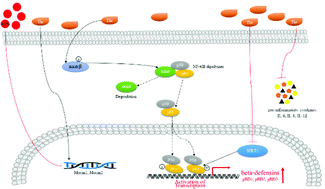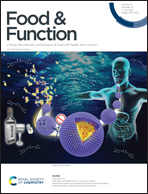l-Threonine upregulates the expression of β-defensins by activating the NF-κB signaling pathway and suppressing SIRT1 expression in porcine intestinal epithelial cells
Abstract
The use of antimicrobial peptide (AMP), found in all forms of life and playing a pivotal role in the innate immune system, has been developed as a new strategy for maintaining intestinal health and reducing antibiotic usage due to its ability to resist pathogens and commensal microbes. The current study investigated the effects of L-threonine on β-defensin expression, the intestinal mucosal barrier and inflammatory cytokine expression in porcine intestinal epithelial cell lines (IPEC-J2). The results revealed that in IPEC-J2 cells, L-threonine significantly increased the expression of β-defensin (including pBD-1, pBD-2, and pBD-3) in a dose- and time-dependent manner (P < 0.05). By using different concentrations and treatment times of L-threonine, the results showed that the expression of β-defensin was upregulated to the greatest extent in IPEC-J2 cells cultured with 1 mM L-threonine for 24 h. Although the mRNA expression levels of β-defensins were markedly increased (P < 0.05), there was relatively little inducible pBD-1, pBD-2 and pBD-3 mRNA expression at the sub-confluent and confluent densities in comparison with post-confluent densities. Furthermore, we found that L-threonine enhanced the β-defensin expression by suppressing the expression of SIRT1, which increased acetylated p65 expression, and activating the NF-κB signaling pathway, which induced the translocation of p65 from the cytoplasm to the nucleus. In addition, L-threonine significantly prevented LPS-induced intestinal mucosal barrier damage by attenuating the decreasing tendency of the mRNA expression of Mucin1 and Mucin2 (P < 0.05). Simultaneously, L-threonine enhanced the expression of β-defensins upon LPS challenge in IPEC-J2 cells (P < 0.05). L-Threonine obviously decreased the mRNA expression of inflammatory cytokines compared to that in untreated cells (P < 0.05). In conclusion, L-threonine can upregulate β-defensin expression and reduce inflammatory cytokine expression in IPEC-J2 cells; meanwhile, L-threonine alleviates LPS-induced intestinal mucosal barrier damage in porcine intestinal epithelial cells. The L-threonine-mediated modulation of endogenous defensin expression may be a promising approach to reduce antibiotic use, enhance disease resistance and intestinal health in animals.



 Please wait while we load your content...
Please wait while we load your content...